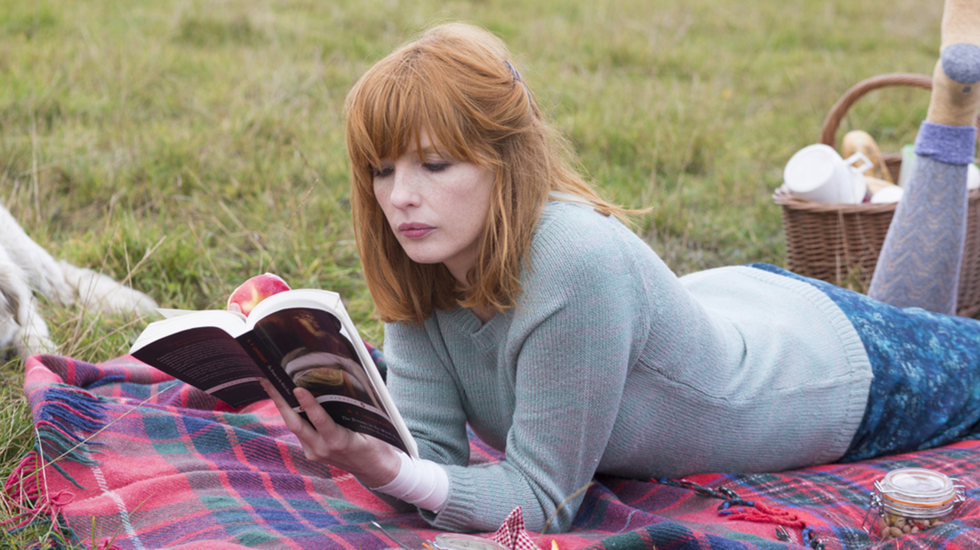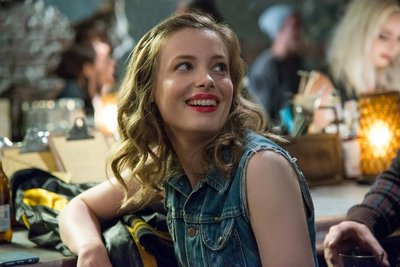
BY KAREN KEMMERLE |
Kelly Reilly on ‘Calvary’ And Finding Strength Within Her Characters
We spoke to the acclaimed actress about her latest film, working with Brendan Gleeson, and how to produce great art.

One of the hardest working actresses from across the pond, Kelly Reilly first broke into the mainstream with her role opposite Denzel Washington in Flight (2012). Her latest movie, the grim character study Calvary, was written and directed by John Michael McDonagh (The Guard). In the film, Reilly plays Fiona, the troubled daughter of the local priest (Brendan Gleeson), who has no idea a threat has been made against her father’s life. The two struggle to repair their damaged relationship, and Fiona ultimately finds herself through this healing process.
We got the chance to sit down with Kelly Reilly to chat about her character, the importance of silence and how her creative process varies from role to role.
Tribeca: I can’t remember the last time I saw a movie that explores modern morality and the nature of religion and sacrifice as candidly as Calvary. What were your first reactions to the script?
Kelly Reilly: It felt like reading a play, but at the same time, it managed to be very cinematic. You don’t usually get such brilliantly drawn characters in film, especially the smaller characters with just one or two lines. The completeness of the script just really struck me.
The subject matter of child abuse within the church is such an important issue. It’s also an upsetting one. I remember being very taken aback by the opening line—which I imagine will be the same feeling that the audience will have. I had no idea where John’s script would take me. I had to read it a couple of times. There’s so much in there. It’s such a big film for such a little film, if you know what I mean.
With every character I play, there is a journey to be taken and, ultimately, a struggle, something we all experience at some point.
Tribeca: Your filmography is filled with strong characters—you have a refreshing resume for an actress these days. What initially drew you to the role of Fiona?
KR: It’s funny the way people perceive your characters. I just got asked in one interview why I always seem drawn to very dark, damaged characters. I don’t think of them like that. Fiona is fragile in the beginning, but at the end she finds her strength. With every character I play, there is a journey to be taken and, ultimately, a struggle, something we all experience at some point.
In a film, you go through someone’s turmoil and resolution in two hours; in life, it can take ten years or longer. Fiona has a quiet strength, and Brendan [Gleeson] describes his character’s relationship with Fiona as not just father and daughter, but as soul mates. They are very much alike and in tune with each other. It proves to be a beautiful relationship, however damaged it is. They just need a few conversations on some blustery beaches and a few tears [laughs]. The death of the mother was obviously a big loss for both of them. He ran to the church and she turned into a bit of a tear away.
Tribeca: Brendan Gleeson is such a force to be reckoned with on-screen. You two share several emotional father-daughter scenes together. Can you talk about working with him?
KR: It was so easy. I hate this word when it’s attached to anything artistic, but our progress was incredibly organic. There was no pretend with us. We never had to search for the moment of authenticity. We just tried to fill each scene with as much heart as we could muster and let it go. That’s what happens when the writing’s good. John’s script is so incredible. When you’re on a beautiful cliff top, wearing a beautiful coat, and speaking his beautiful words, it takes a lot to mess it up [laughs]. I think I was just very lucky that I was given the space by John and Brendan to take Fiona where I wanted to her to go.
Tribeca: If you had to choose one word to describe John Michael McDonagh as a director, what would it be and why?
KR: I would describe him as brilliant. I don’t know how he’s done it. If you meet him, he’s very evasive; he’s a real Southlander. He downplays how much he loves writing, but he puts so much of himself into his work. His script reveals his opinions on politics, on war. It reveals his opinion on the church and faith and, ultimately, on goodness. The greatest reveal is the end. This is no black, dark-hearted film. It’s filled with tenderness. I really appreciate that he has given the female character in this film such a moment of incredible grace.

Tribeca: At one point in the movie, Father James says “we talk so much about sin, but not enough about virtue.” I think that’s the thesis of the movie.
KR: I absolutely agree with you. Another line that really struck me was when Maria Jose, who plays the widow, says “some days I think I can’t go on, but I will go on”. And that’s life! You know what I mean? All of us get knocked on our asses at some point. We’re all going to lose people we love, we’re all going to go through experiences that bring us to our knees—and hopefully we’ll have enough spirit to kind of get back up again.
Tribeca: I don’t want to give anything away, but I was really moved by Fiona’s last scene in the film in which she appears to be giving absolution. Was that the most difficult scene to shoot?
KR: Yes. As audience members, we all have to suspend our imagination. It’s the closest thing to childhood awe we have as adults. I think that’s what’s so great about movies, and theatre, and art in general. I went deep into my imagination for my final scene. Before we shot, we didn’t talk about the scene--no one said a word—the cameras just rolled. In a moment where Fiona could show an incredible array of emotions, she chose to show love. I find that notion of grace really moving. You don’t usually see that in films today.
Tribeca: I think some filmmakers are afraid to let their films breathe in silence.
KR: I love silence, but you don’t get to experience that as an audience as much anymore. When I’m watching television here in America, I miss having the credits roll with some music. Let me digest what I’ve just seen! Once a show is over, there’s immediately an ad or someone talking. We need to allow ourselves a moment to be touched. We all need that catharsis. I think that’s the point of art and entertainment. On a deeper level I do believe that we’re all doing this so we don’t feel alone.
We need to allow ourselves a moment to be touched. We all need that catharsis.
Tribeca: You’re no stranger to a television audience. My whole family—especially my mother—love Above Suspicion. It’s so great!
KR: It’s amazing how big it is in America [laughs]. I had no idea! We might have to bring that back to life. We live in an age where it’s all about numbers and ratings so we had to stop making them. We all loved making the show. Ciaran Hinds is one of my dearest friends. I think we’d all do it again if there was a demand for another series.
Tribeca: You have switched between film and television roles throughout your career. Do you find yourself changing your creative process at all in going between the two?
KR: It’s always changing. I’m always being surprised. I have a different relationship with every job I do. There were years where I wasn’t connected to the work I was doing, and that was very unsatisfying for me. There was probably a three or four year gap where that happened. Now, I’m back and feeling very connected to the roles I have been given, which feels really exciting and exhilarating again. The more I work, the more I realize I don’t know what exactly makes great art. All I know is art springs from one magic formula—an unselfconscious group of minds and hearts getting together with creative integrity.
Art doesn’t always have to be serious. I like watching an entertaining piece of silliness as much as the next. If Sleepless in Seattle is on, I grab a glass of wine and sit on the couch. That, to me, is happiness. I’m always incredibly moved by great writing and great acting. I constantly want to be in the spaces that movies provide. I think Calvary touches that magic.
Calvary is now playing in select theaters.

